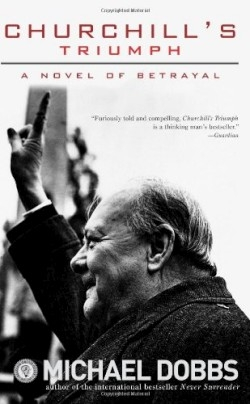Churchill's Triumph
A Novel of Betrayal
Perhaps God could create the world in His image in only six days; it took slightly longer for three mortal men to totally remake it in theirs.
The three were the most powerful leaders in the world—Franklin Roosevelt, Josef Stalin and Winston Churchill—and they met at Yalta on the Black Sea during the closing months of World War II to decide the fate of the world, especially Germany and the country which had suffered the most during Hitler’s mad gambit at global domination, Poland. For eight days they conferred as supposed equals and allies, as the representatives of the victorious United States, the Soviet Union, and the British Empire. But Churchill sensed England’s empire was nearing its end, and as he argued to enlist Stalin’s support in the fight against Japan, it became utterly clear that the free world would soon face a new nemesis, one perhaps even worse than the Axis; for the Russian Bear sought to occupy the European power vacuum brought about by the looming defeat of Hitler.
This historical novel is so well-written that the reader can easily forget that the crisp dialogue, verbal haranguing, and mental jousting between Churchill and Stalin for Roosevelt’s support are not verbatim transcripts of the actual events. For example, early in the conference, Churchill learns that far more than the fate of Germany is at stake:
Stalin picked up his empty pipe and sucked thoughtfully. “How long will American troops stay in Europe after the war is over, Mr. President?“ asked Stalin softly.
“Two years would be the limit,“ said Franklin.
Then Stalin turned toward Churchill. There were no words. All he had to say was contained in his yellow eyes, and in the small smile he was unable to resist.
[i]Two years. Two years! Inside, Churchill was screaming like a condemned man who had just seen the executioner sharpening his axe. Poland obliterated. Germany in ashes. France prostrate. Britain destitute. And America gone. Nothing would stand between the Kremlin and the Atlantic coast — nothing, that was, but honor, and humanity, and any agreement they might reach at this conference.[/i]
And what Stalin knew of honor or humanity could be crammed into the bowl of his pipe.
Churchill’s hopes of staving off Stalin’s brutal plans for Eastern Europe by allying with Roosevelt at the conference were bitterly crushed. The American President’s precipitously declining health and idealistic hopes of forming the United Nations bent him to Stalin’s iron will and clever gamesmanship. Stalin cared not a whit for Roosevelt’s U.N. dream, but he used its importance to the American president to wrangle numerous concessions concerning the war-torn eastern European countries. When a disguised Polish nobleman appears at Churchill’s suite to recount the horrific tale of the Soviet massacre of thousands of Polish officers at Katyn, the mass murder that the Russians eventually blamed on the Germans, Churchill swears he will not allow the Bear to devour helpless Poland.
As the events of the historic eight days unfold, however, Churchill finds that he must choose between making a deal with the Devil to help end the horrific war or keeping his word—and his soul—intact. His anguish as he grapples with his decision is almost palpable and makes for enthralling reading.
The author knows his subject intimately. His publications include another Winston Churchill novel, Never Surrender, which recounts the beginning of World War II and Churchill’s steadfast determination during England’s bleak prospects against the Nazi onslaught. He paints a portrait of Churchill as a complex and riveting individual—a famously strident and blustery orator, a grumpy but sentimental statesman, and a father who could somehow overlook a Soviet diplomat’s attempted sexual assault on his daughter for the greater good of the conference, and the world.
Of course, with the hindsight of history, the reader knows that Stalin will ultimately gain the upper hand at Yalta and will then raise an Iron Curtain across a divided Germany and Eastern Europe. Still, revisiting the events from Churchill’s perspective is compelling. Especially intriguing are Churchill’s feelings of betrayal by Roosevelt, the man he credited as the savior of England and whom he truly thought of as a friend. For Churchill understood that his place in history would be defined at Yalta, and the taste of defeat was bitter on his lips even as he raised his glass to toast Marshall Stalin and raised his pen to sign the final accord.
This exceedingly well-crafted book will appeal to the history buff, the World War II aficionado and to the lover of great fiction alike. Despite the darkness that descended across Europe under Stalin, Churchill believed his Yalta gambit was the right course of action. The reader is left to decide whether, in the end, Yalta was truly Churchill’s triumph after all.
Reviewed by
Alan J. Couture
Disclosure: This article is not an endorsement, but a review. The publisher of this book provided free copies of the book to have their book reviewed by a professional reviewer. No fee was paid by the publisher for this review. Foreword Reviews only recommends books that we love. Foreword Magazine, Inc. is disclosing this in accordance with the Federal Trade Commission’s 16 CFR, Part 255.

